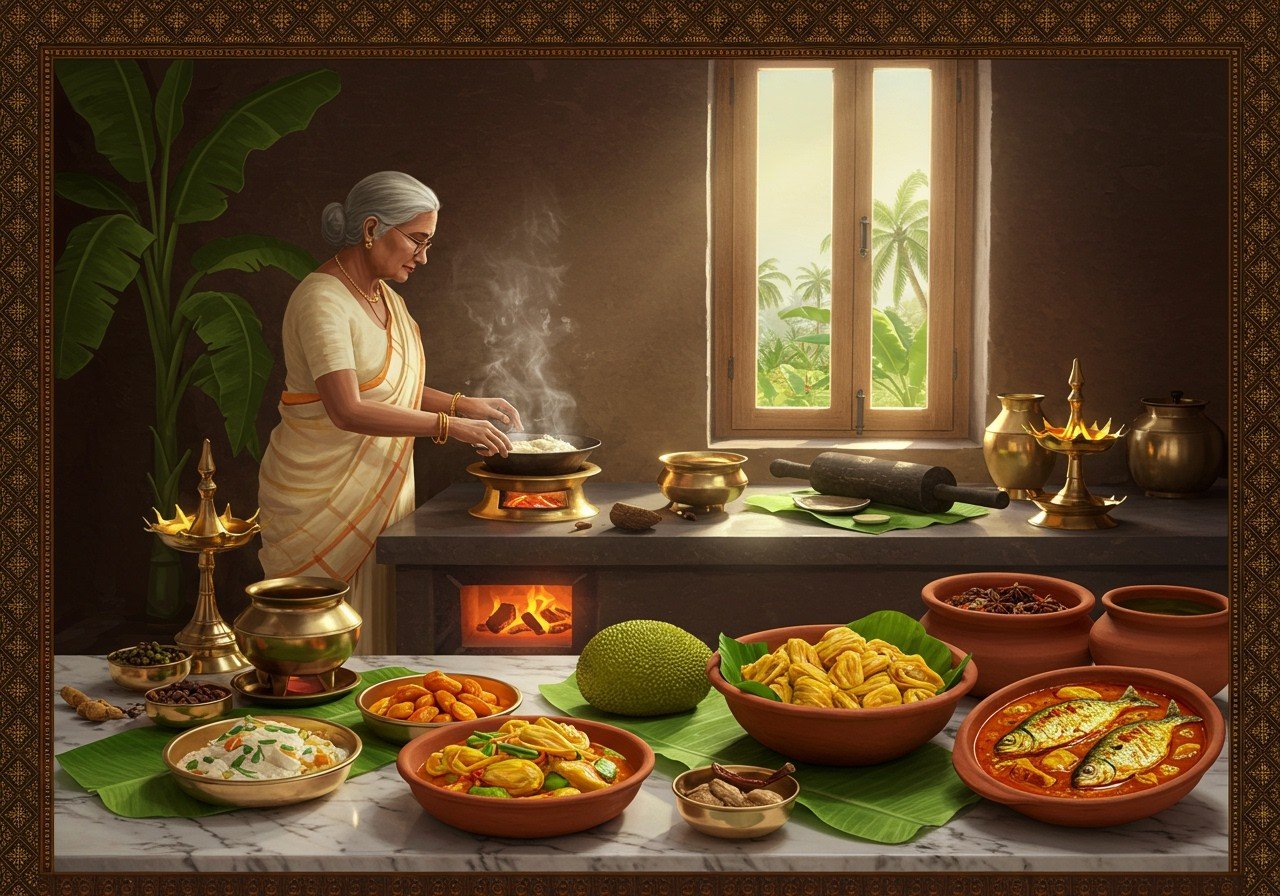
Ezhava cuisine holds a special place in Kerala’s diverse culinary tapestry, deeply interwoven with the community’s agricultural and coastal lifestyle. Passed down through generations, these traditions are more than just recipes; they’re a celebration of heritage, community bonds, and the profound role of food in cultural identity. Let’s embark on a flavorful journey through the heart of Ezhava culinary traditions.
Traditional Ezhava Dishes: A Symphony of Flavors
Ezhava cuisine beautifully showcases the community’s love for fresh, local ingredients. Picture this: Kappa (tapioca) served with a fragrant Meen Curry (fish curry), a testament to their coastal life. Avial, a medley of vegetables simmered in coconut milk, graces special occasions, reflecting the bounty of the land. And for a comforting breakfast, Puttu, a steamed rice cake, paired with flavorful Kadala Curry (black chickpeas), is a beloved choice.
For those who savor richer, bolder flavors, Theeyal is a must-try. This tangy and spicy curry, infused with roasted coconut, offers a unique culinary experience. And during festive times, Pulissery, a yogurt-based curry, adds a touch of celebration to the meal.
At poojn.in, we understand the importance of honoring these traditions. Explore our range of pure spices and traditional servingware to elevate your Ezhava culinary experience.
Ezhava Food Customs: A Tapestry of Togetherness
In Ezhava culture, meals are much more than sustenance; they are expressions of togetherness and shared heritage. Serving food on fragrant banana leaves is a cherished practice, believed to enhance both taste and nutritional value. Using homegrown ingredients connects families to their agrarian roots, fostering a deep appreciation for the land’s gifts.
Vegetarian dishes hold a special significance during religious festivals and auspicious occasions, reflecting reverence and purity. Women play a pivotal role as keepers of culinary wisdom, passing down recipes through generations, ensuring these traditions live on. The influence of Ayurveda can be seen in the mindful selection of ingredients and cooking methods, emphasizing balance and well-being.
Festival Recipes: Celebrating Life’s Milestones
Festivals are a time when Ezhava cuisine truly shines. During Onam, the grand Onasadya takes center stage. This elaborate vegetarian feast, served on a banana leaf, is a sensory delight, featuring a kaleidoscope of flavors and textures. Ada Pradhaman, a sweet treat made with rice, jaggery, and coconut milk, adds a touch of sweetness to the celebrations. For Vishu, the first day of the Malayalam New Year, **Vishu Kanji**, a comforting rice porridge with coconut milk, is prepared. And during the monsoon month, **Karkidaka Kanji**, a nourishing and medicinal porridge, is enjoyed for its health benefits.
Looking to prepare a traditional Vishu feast? Poojn.in offers a wide selection of high-quality spices and incense to create the perfect ambiance for your celebrations.
A Revival of Tradition: Pork in Ezhava Cuisine
While Sree Narayana Guru encouraged his followers to abstain from meat, many families continue to embrace older food traditions. The Ezhava community’s connection with pork is particularly noteworthy, especially during festive occasions. **Erachi Panni Curry**, a slow-cooked pork stew prepared on the eve of Vishu, is a prime example of this tradition’s revival. This rich and aromatic dish embodies the community’s culinary history.
Ezhava Cuisine: A Legacy of Flavors
Ezhava cuisine is not just about food; it’s a living testament to the community’s resilience, adaptability, and deep connection to their roots. As you savor these traditional dishes, you partake in a legacy that stretches back generations. Poojn.in is honored to support the preservation of these culinary treasures. Visit us at www.poojn.in or call us at 03369029784 to explore our complete collection of pooja items and traditional cooking essentials.
FAQs About Ezhava Culinary Traditions
What makes Ezhava cuisine unique? Ezhava cuisine stands out with its focus on fresh, local ingredients, particularly coconut, rice, and seafood. The subtle blend of spices and the use of traditional cooking methods create a unique flavor profile.
Are there specific dietary customs in Ezhava tradition? While many Ezhavas enjoy non-vegetarian dishes, vegetarian meals are customary during festivals and religious occasions. Serving food on banana leaves is a common practice, adding a touch of tradition to meals.
What is the role of Sree Narayana Guru in Ezhava food culture? Sree Narayana Guru’s teachings encouraged abstinence from meat and alcohol, influencing the dietary choices of many followers. However, older traditions, including the consumption of pork during festivals, continue to be practiced by some families.
What are some essential ingredients in Ezhava cooking? Coconut, in various forms like grated coconut, coconut milk, and coconut oil, is a cornerstone of Ezhava cuisine. Rice, spices like turmeric and mustard seeds, and fresh vegetables are also essential components.
Where can I experience authentic Ezhava cuisine? You can find Ezhava dishes in many restaurants across Kerala and in cities with a significant Malayali population. For a truly authentic experience, try visiting local homes during festivals or special occasions.
We invite you to explore more about Kerala’s rich cultural heritage through our blogs on Kerala’s Sacred Foods and Kerala Temple Architecture.


